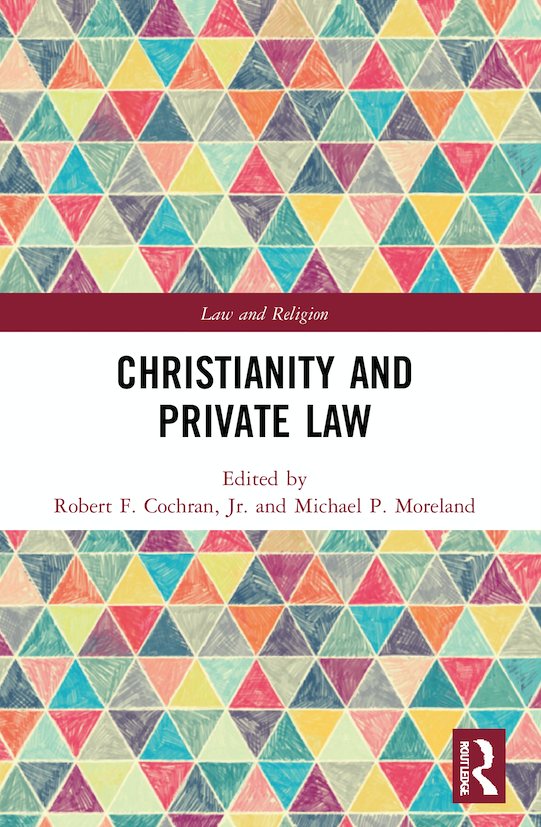
Christianity and Private Law
edited by Robert F. Cochran, Jr. and
Michael P. Moreland
Review by John Witte, Jr.
This volume is one of several new introductions to Christianity and Law commissioned by the Center for the Study of Law and Religion at Emory University. Each volume is an anthology of some twenty chapters written by leading scholars. The volumes contain historical, doctrinal, and comparative materials designed to uncover Christian sources and dimensions of familiar legal topics. Each is authoritative but accessible, calibrated to reach students, scholars, and instructors in law, divinity, graduate, and advanced college courses as well as readers from various fields interested in what Christianity has, can, and perhaps should offer to the world of law. Earlier titles in this series include Christianity and Law (2008); Christianity and Human Rights (2011); Christianity and Family Law (2017); Christianity and Natural Law (2017); Christianity and Global Law (2020); and Christianity and Criminal Law (2020). Other titles are in press on Christianity and Conscience, Constitutionalism, Ecclesiastical Law, Economic Law, International Law, and Migration Law. We aim to commission other such volumes on Christianity and bankruptcy law, education law, elder law, environmental law, health law, labor law, procedural law, remedies, and other familiar legal topics.
A quarter century ago, Robert F. Cochran, Jr. teamed up with fellow legal heavyweights Michael McConnell and Angela Carmela to assemble a pathbreaking study titled Christian Perspectives on Legal Thought (Yale University Press 2001). That welcome and courageous volume explored the interaction of various Christian traditions with prominent schools of legal thought at the time: political liberalism, legal realism, critical legal studies, feminist legal theory, critical race theory, and law and economics. It also explored the past, present, and potential contributions of Christianity to substantive legal topics in environmental law, criminal law, family law, contracts, torts, and legal ethics. Two dozen law professors contributed original chapters to that volume, which the editors adroitly arranged as the first dots on a very large canvas depicting various modes of interaction between law and Christianity.
Today, a good bit more of this canvas has been filled in, owing to the work of some 1,500 scholars worldwide who are now part of a rapidly growing guild of law and religion study. Some 50 centers, institutes, and programs in law and religion have popped up on campuses around the globe — more than half in the United States, but with growing numbers in Europe, Africa, Latin America, Asia, and Australia, New Zealand and other nations of thePacific Rim. These groups are being further integrated by international and regional consortia for the study of law and religion and by dozens of periodicals and blogs on law and religion. Several leading presses — Ashgate, Brill, Cambridge, Eerdmans, Mohr Siebeck, Notre Dame, Orbis, Oxford, Routledge, Schöningh, Springer, and Vandenhoeck & Ruprecht — have each established new book series or collections on law and religion, and the body of law and religion scholarship in multiple world languages is growing briskly.
The interaction of law and Christianity continues to be a central theme of this burgeoning global law and religion literature, yielding a much more nuanced picture of Christian contributions to various areas of law historically and today. This volume on Christianity and Private Law (Routledge 2020) is a welcome and novel contribution to this literature. It again features the editorial leadership of Professor Cochran and his Nootbaar Institute of Law, Religion, and Ethics at Pepperdine. Joining him on the masthead is distinguished Catholic legal scholar, Michael P. Moreland, new director of the Eleanor H. McCullen Center for Law, Religion and Public Policy at Villanova. Included are 16 fresh chapters by several notable legal historians, including R.H. Helmholz and James Gordley, and a sturdy company of other legal scholars, including Angela Carmella and David Caudill, who were part of the earlier overview volume on Christian Perspectives on Legal Thought.
In both civil law and common law lands, private law focuses on the voluntary and involuntary legal relationships between private parties, whether individuals or private groups.
“Private law” is a common phrase for Europeans who readily divide the legal world into public, private, penal, and procedural law categories, building in part on ancient Roman law, medieval canon law, and modern civil law. “Private law” is a less common term for Anglo-American common lawyers. They are more familiar with several discrete legal subjects that Europeans gather under the canopy of private law – contracts, property, and torts at the center of the canopy, associational law, family law, testamentary law, civil procedure, remedies, and other topics nearer the periphery. In both civil law and common law lands, private law focuses on the voluntary and involuntary legal relationships between private parties, whether individuals or private groups. The laws of the state – sometimes the laws of other non-state associations, too – facilitate and support those private relationships, articulate and vindicate interests and expectations that emerge from them, and offer remedies for harms that result from misfeasance, nonfeasance, or breach of duty by another. The editors and several chapter authors do a fine job defining and defending “private law” as a category, and drawing interesting relationships between contracts, torts, and property which are the main subjects treated in these pages.
“Christianity” comprises all manner of Christian ideas and institutions, norms and habits that are shaped by the familiar quadrilateral of Scripture, tradition, reason, and experience. Distinct Catholic, Calvinist, Lutheran, Anglican, Anabaptist, and Evangelical voices, both historical and contemporary, come through in these pages, as well as a notable Jewish perspective on contract law from Michael Helfand. The authors variously trace, describe, interpret, and critique the discrete contracts, property, and torts topics assigned to them. Opening chapters in each of the four sections are devoted to biblical and traditional Christian teachings. They underscore the depth, nuance, and complexity of Christian engagement with these fundamental private legal relationships. Constructive and critical chapters later in each section highlight and illustrate the enduring value of these traditional Christian teachings for addressing discrete modern private law questions. At the heart of many of these Christian reflections on torts, property, and contracts is the fundamental biblical question about how to love all of our neighbors – even our enemies and others who hurt us. Do we “turn the other check” to the tortfeasor? Do we give aid and comfort to the stranger in imitation of the Good Samaritan? Do we give our “second coat” to the thief who has stolen our first? How do we responsibly acquire and use, have and hold, share and steward our property? How do we balance freedom and fairness in contract? Is it just price or just market price that sets the bargain? Do we sue, arbitrate, or mediate our private conflicts, given the biblical injunction to “Go tell it to the church”? And how do we judge and reason through the private law conflicts in a way that balances justice and mercy, rule and equity, principle and prudence?
These and many other questions have inspired centuries of deep thought by Christian jurists and judges who have variously drawn on biblical, theological, jurisprudential, historical, and natural law arguments to work out their legal systems. That rich world of Christian perspectives on private law is nicely illustrated in these authoritative but accessible chapters that will edify novices and experts alike. ♦

John Witte, Jr., JD (Harvard); Dr. Theol. h.c. (Heidelberg), is Robert W. Woodruff Professor of Law, McDonald Distinguished Professor of Religion, and director of the Center for the Study of Law and Religion at Emory University. A specialist in Legal History, Human Rights, Religious Freedom, Marriage and Family Law, Law and Religion, he has published 280 articles, 17 journal symposia, and 35 books.
Recommended Citation
Witte Jr., John “Christianity and Private Law.” Canopy Forum, December 15, 2020. https://canopyforum.org/2020/12/15/christianity-and-private-law.


